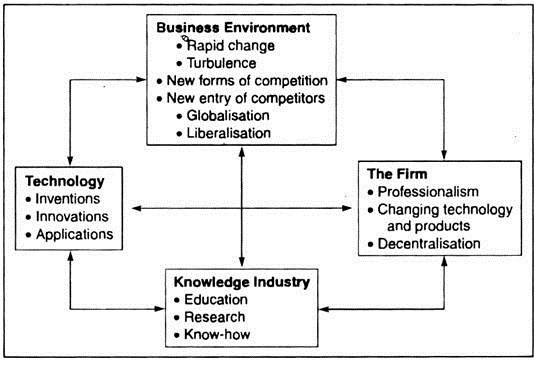In this article we will discuss about the importance of studying strategic management.
Innovations and inventions in techniques and in goods and services have stimulated the growth of the ‘knowledge industry’, and been stimulated by it. As a consequence, the environment of organisations has shown rapid and turbulent change and has led to new forms of competition and challenges to a business firm.
The whole paradigm can be viewed from this diagram below:
In other words, we see a host of factors and reasons in support of the study and application of strategic management practices.
ADVERTISEMENTS:
Some of them are discussed hereunder:
1. Business decisions depend on, and involve great risk on account of, changes taking place in the economic and technological environment. Strategic management can systematise the business decisions.
2. Study of strategic management coupled with ‘knowledge industry’ can educate the business managers to understand the inherent problems so as to make rational decisions in times of need.
ADVERTISEMENTS:
3. Corporate activities are multi-dimensional and multi-directional and becoming complex in view of what is charted in the diagram above. Short-term planning depending on situations and necessary coordination and communication in the areas of resource allocation require strategic management practices.
4. Globalisation and liberalisation of economy in various countries including India have opened up new vista of opportunities associated with threats in the business world. Advantages and disadvantages and the crucial issues are needed to be properly assessed and weighed. This is possible by strategic planning and management practices.
5. For attaining business success, a viable match between external environmental variables and internal organisational conditions of a firm has to be made. A firm which develops formal strategic management system can have an edge over others.
In addition to the overall benefits contemplated, several specific benefits that accrue are classified below:
ADVERTISEMENTS:
(A) Management and Organisation Benefits:
(i) Identification of future marketing opportunities and their exploitation;
(ii) Quantification of the effects of adverse business conditions and changes and their minimisation:
(iii) Effective allocation and utilisation of physical and financial resources to the identified opportunities;
ADVERTISEMENTS:
(iv) Continuous review and analysis of plan execution and effective control of business and operational activities;
(v) Establishment of viable objectives and relating major decisions and actions to achieve those objectives; and
(vi) Attainment of basic functional objectives like coordination of plans and actions, identification of priorities under constraints, combination of diverse functions into a unified effort, pursuing contingent planning in times of need, and so on.
(B) Personnel Benefits:
ADVERTISEMENTS:
(i) Integration and harmonisation of the behaviour of individuals to attain a combined effort;
(ii) Clarification of individual roles and responsibility and thereby attaining organisational motivation;
(iii) Stimulation of a cooperative and enthusiastic approach to tackling problems;
(iv) Creation of an attitude of mind in personnel to accept and face changes and challenges; and
ADVERTISEMENTS:
(v) Finally, initiation of a balanced discipline in the management team to steer clear all business hurdles that would not be possible without strategic management.
The multinational corporation (M.N.C) is a feature of this century. Most large U.S. corporations are multinational. Their operational extensions have led to an internationalisation of production and distribution on a global scale.
In fact, M.N.Cs have drawn up appropriate strategies and tactics to Meet their own goals and objectives and have attempted to be sufficiently flexible to adopt themselves to the international business environment.
It is in the fitness of things, if the Indian business houses adopt sound and effective strategic planning exercises to make their management rise to the challenge of the external environment and to overcome internal limitations.
ADVERTISEMENTS:
The chief executive and managers of the Indian industries, in their proper study of strategic management process, should begin to identify factors e.g., new market thrust or product development and determine critical choices and adjustments in organisational performance.
